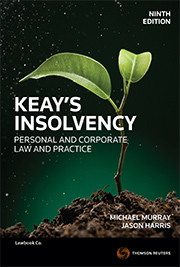Other constitutional restrictions on our politicians – treason, and bankruptcy

This commentary need not distract us from the important issue being heard by the High Court on Tuesday 10 October 2017, as to the eligibility of certain members of parliament to remain in office. But it is interesting to look at the other restrictions under our Constitution – treason, understandably, but also bankruptcy. The impending […]
Codes of conduct
Codes of conduct need to remain in step with on-going changes in the commercial and business worlds in which they operate. Otherwise they lose their relevance and purpose. That could then lead to a point where compliance with a Code is found to be contrary to the law, for which sanction may be meted. In […]
Keay – phoenix reforms

It is good to see that that several reform issues raised in my and Jason Harris’ textbook, Keay’s Insolvency, appear in the government’s anti-phoenix paper – as to a government liquidator, and funding of liquidators; dealing with abandoned companies; a focus on preventive rather than reactive regulation; and even down to the adoption of bankruptcy […]
Surveillance /səˈveɪl(ə)ns/

“close observation, especially of a suspected spy or criminal”: Oxford Dictionary. In relation to professional and industry regulation, as relevant, a website count of the regulators’ use of the term “surveillance” shows these numbers: AFSA 3 ATO 29 FMA NZ 35 APRA […]
Insolvency Law Reform Act – some real legislation errors

woodfer The changes effected by the Insolvency Law Reform Act 2016 are now law with some parts having commenced on 1 March 2017 with the remainder on 1 September 2017. Any new law causes some disruption but it can also serve to clean out some of the old ways, in particular those in corporate insolvency, […]
The new insolvency laws – their benefits

The changes effected by the Insolvency Law Reform Act 2016 are now law with some parts having commenced on 1 March 2017 with the remainder on 1 September 2017. Any new law causes some disruption but it can also serve to clean out some of the old ways, in particular those in corporate insolvency and the […]
‘The International Court of Justice as a Working Court’ – Judge James Crawford

On 25 September 2017, the annual “Patron’s Address” of the Australian Academy of Law is being given by his Excellency Judge James Crawford AC, SC, FBA, a Judge of the International Court of Justice (ICJ). Professor Crawford was elected Judge of the ICJ in 2014, taking up his post in February 2015. He will speak […]
The fine print in an ASIC form

With Australia’s new insolvency laws commencing this Friday 1 September, there is a late flurry of activity from the legislature to tidy up the Acts, Schedules, Rules and Regulations that will now apply; from the Courts in updating their rules and processes; and from the regulators in issuing their new forms and guidance, if any. […]
Amerind and Killarnee – ships in convoy, or on a collision course?

Over 35 years ago, a Judge said that if a liquidator winding up a trustee company were to lose out in relation to the priority of his remuneration, it would be “unjust that he should perform his important and sometimes difficult duties without reward. In future it is unlikely that companies carrying on no business […]
Insolvency practitioner regulation – New Zealand & Australia

Comparing NZ insolvency law with Australia’s, in preparation for the BFSLA conference this week on 1 September 2017, the day that Australia’s new insolvency laws commence, reveals some interesting comparisons in how practitioners are respectively regulated, and at what cost. For example, NZ proposes a NZ$2 levy on companies to fund the cost of regulation, […]
Managed Investment Schemes – proposed reforms

The problems with managed investments schemes (MIS) have been well documented in recent times. A 2016 Senate Report into Agribusiness MIS addressed the collapse of many such schemes resulting in ‘inexperienced investors [losing] not only their investment and prospects of future income but [being] also saddled with the burden of repaying the loans and interest […]
The IBA Annual Conference Sydney, 8–13 October 2017

Among many sessions across a wide range of legal disciplines, the IBA conference has this series of insolvency sessions. Avoiding that sinking feeling: navigating shipping insolvencies The Hanjin collapse at the end of August 2016 left 147 vessels stranded around the world, unable to enter port. Hanjin was the latest in a series of high-profile […]
Liquidators, and ASIC, acting without authority – all fixed

When a person inadvertently exercises powers without legal authority, a prompt legal response is required. The consequences can be serious, as two company liquidators, and more so ASIC itself, recently found out. The two liquidators join a long list of fellow bankruptcy trustees who have also inadvertently not renewed themselves. Liquidators’ registrations expiring Two liquidators inadvertently […]
What’s on …. insolvency and related conference and seminars 2017 into 2018

A list of conferences for the rest of the year, into 2018 in some of which one or other of the team at Murrays Legal is involved or presenting. Questions welcome. 2017 23-27 August Melbourne Forum, Japan 31 August-2 September BFSLA Brisbane 4 September Asian Insolvency Law Reform, Melbourne 4-7 September IAIR […]
The new Code of Banking Practice – what and when?

In evidence before the Senate Select Committee on Lending to Primary Production Customers on 11 August 2017, the Chief Executive of the Australian Bankers Association, Anna Bligh, said that the Code of Banking Practice is currently being re-written. “The industry has taken the view that the code should be approved by ASIC. If so, it […]
ABA’s Anna Bligh and bank lending reforms

Anna Bligh, the Chief Executive of the Australian Bankers Association, has recently spoken of the “strong and mutually beneficial relationship between the banking sector and the restructuring and advisory sector”, including how the industry plays an integral corporate advisory role when small businesses are going through tough times. In preparing her published speech for the ARITA conference, […]
Pay your tax debt now – only $…99.99

While a retailer’s $99.99 is a typical example of psychological pricing, the Tax Commissioner’s figure of $8,453,699.99 is not. Rather, is it the amount claimed by the Commissioner from Philip Whiteman, in on-going proceedings connected with Whiteman’s claimed involvement in unlawful phoenix activity. The Commissioner succeeded before Justice Davies in obtaining summary judgment in that […]
The cost of a victim of crime in pursuing her own justice

The personal and financial suffering that a victim of a serious physical crime can go through, and the costs of pursuing justice, are displayed incidentally in this bankruptcy related decision of the Administrative Appeal Tribunal (AAT). The victim successfully sued her assailant for damages, and recovery of his assets, and was awarded over $500,000. He […]
“a sad (but regrettably not uncommon) occurrence in contemporary professional life”.

“The personal circumstances of DDQ offer a sad (but regrettably not uncommon) occurrence in contemporary professional life”. A disciplinary tribunal dealt with the circumstances of DDQ – a solicitor who had practised successfully since 2008 but with a “difficult and arduous” workload, his mental health declined and he left legal practice in 2012. He became […]
External dispute resolution and the Ombudsman

Ms Kate Carnell, the Australian Small Business and Family Enterprise Ombudsman, is reported to have called “on the insolvency sector to improve its accountability and transparency or face louder calls for increased regulation”. EDR According to a media release, only, Carnell said at the ARITA conference that there should be an external dispute resolution (EDR) […]
A case of ‘just in case’ – Network Ten

The concept of “potential” or “putative” insolvency administrators who have had “recent, long-term, substantial and remunerative involvement” with the company before they are appointed to administer it has been raised in Korda, re Network Ten: [2017] FCA 914. There, the Federal Court accepted the continuation of Korda Mentha as administrators, but ordered the appointment of […]
Bankruptcy trustees’ remuneration challenge – continued

A Victorian Supreme Court decision gives some background to the regulator’s decision to reduce bankruptcy trustees’ remuneration by over $277,000, a decision being challenged in the Federal Court on 30 August 2017. Groll was made bankrupt pursuant to a sequestration order on 2 September 2014. A guardian and administrator was appointed to his estate on […]
The need to pick up the phone….

An appeal court has confirmed a finding that a liquidator who did not telephone a director to inquire about money apparently transferred by the company before its liquidation had breached his duties to the company under s 180(1) of the Corporations Act; but because the company suffered no loss as a consequence, no compensation was […]
Speech by Justice Black on Insolvency Law

In a speech given to ARITA’s conference on 9 August 2017, Justice Ashley Black of the NSW Supreme Court has given a descriptive overview of some of the important issues and cases in Australian insolvency law. Justice Black reviews the changes made by Insolvency Law Reform Act 2016 (ILRA) to the Corporations Act resulting in […]

